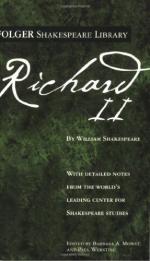|
This section contains 10,917 words (approx. 37 pages at 300 words per page) |

|
SOURCE: “The Language of Treason in Richard II,” in Shakespeare Studies, Vol. 27, 1999, pp. 134-60.
In the following essay, Cavanagh observes that the topic of treachery plays a central role in the political exchanges in Richard II. Cavanagh explores the way the language associated with treachery is related to the dynamics of authority in the play.
I
Postwar criticism of Richard II characteristically has addressed its portrayal of “the secularization of politics … paralleled by the commercialization of the word.”1 The play is often perceived as describing the transition from a medieval political ethos to early modern conditions. In depicting the violent extinction of Plantagenet monarchy, Richard II also distinguishes the ascendancy of Lancastrian pragmatism, setting a “divinely sanctioned monarch against Machiavellian ‘new man’ whose power resides exclusively in his own will.”2 In particular, the language of Richard II has been identified as expressing this shift from a world which...
|
This section contains 10,917 words (approx. 37 pages at 300 words per page) |

|


